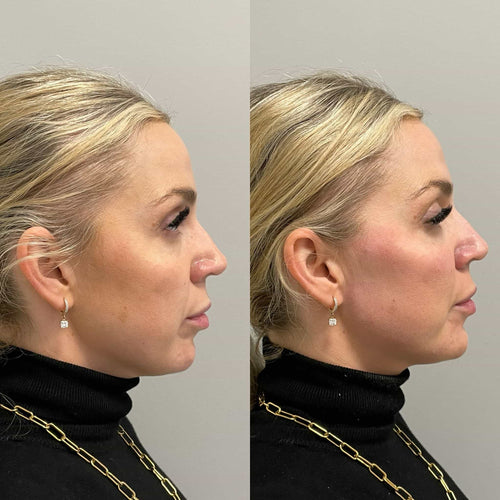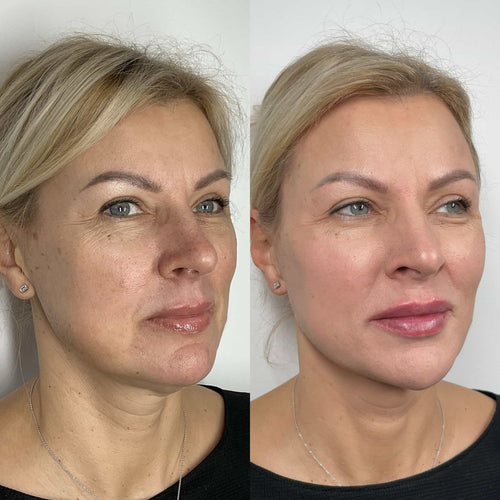Secure a Dermal Filler Consultation with Dr. Laura Geige Now
Before You Get Your Lips Done
Alcohol is Off-Limits
Before getting lip fillers, avoiding alcohol consumption for a few days prior to your appointment is crucial.
Here’s why:
-
Alcohol thins the blood, making it easier to bleed and bruise.
-
This can lead to increased swelling and bruising after the procedure.
-
It can also interfere with the effectiveness of the filler and make it harder for your body to absorb it properly.
To minimize risks and ensure optimal results, adhere to these guidelines:
-
Avoid alcohol 24-48 hours before your appointment.
-
Stay hydrated by drinking plenty of water in the days leading up to and following your treatment.
Following these tips will help create a safe and successful lip filler experience.
Skip the drinks for at least 24 hours before your appointment. Alcohol can thin your blood, increasing bleeding and bruising. The FDA advises against alcohol consumption before any cosmetic procedure.
Before undergoing a lip filler treatment, it’s crucial to avoid alcohol consumption for at least 24 hours prior to your appointment.
Alcohol has blood-thinning properties, which can lead to increased bleeding and bruising during the procedure.
This is because alcohol interferes with platelet aggregation, slowing down the body’s natural clotting process.
The FDA advises against alcohol consumption before any cosmetic procedure, including lip fillers, for this very reason.
By abstaining from alcohol, you can minimize the risk of complications and promote optimal healing.
Don’t Pick or Touch Those Lips
Avoiding lip picking and touching before getting lip filler is crucial for several reasons:
Firstly, picking at your lips can introduce bacteria into open sores or cracks, leading to infection.
Infection can not only ruin your results but also pose a serious health risk.

Secondly, constant touching can irritate the delicate skin on your lips, causing inflammation and swelling.
This makes it more difficult for the filler to be evenly distributed and can lead to an uneven appearance.
Here are some additional things to consider before getting lip filler:
*
Avoid blood thinners: Medications like aspirin and ibuprofen can increase bleeding during the procedure, potentially leading to bruising or swelling.

*
Stay hydrated: Drinking plenty of water in the days leading up to your appointment helps keep your skin supple and promotes healing.
*
Eat a healthy meal beforehand: Avoid fasting as it can make you feel lightheaded during the procedure.
Avoid picking at your lips or applying irritating products like retinol or exfoliants in the days leading up to your appointment. This can irritate the skin, making injection more difficult and potentially causing complications. The Mayo Clinic recommends avoiding irritants before aesthetic procedures for optimal healing.
Before getting lip filler, it’s crucial to prepare your lips properly to ensure a smoother and safer procedure with optimal healing results.
One important step is avoiding any lip irritation in the days leading up to your appointment.
Picking at your lips can cause tiny wounds and inflammation, making injection more difficult and potentially leading to complications during the procedure.
Similarly, topical products like retinol or exfoliants, while beneficial for overall skin health, should be avoided. These ingredients can irritate the delicate lip skin, increasing the risk of discomfort, swelling, or bruising after injections.
The Mayo Clinic emphasizes avoiding irritants before aesthetic procedures, including lip fillers, to promote healthy healing and minimize potential risks.
By taking these simple precautions, you can help ensure a more comfortable and successful lip filler experience.
Post-Injection Care: What to Avoid
Keep it Dry and Clean
Post-injection care is crucial for optimal results and minimizing any potential complications from lip filler treatment.
Here’s what to avoid after getting your lips filled:
-
Touching or rubbing your lips excessively. Resist the urge to constantly touch, prod, or massage the injected area.
-
Applying makeup immediately after treatment. Wait at least 24 hours before applying any makeup to your lips.
-
Drinking through a straw. Suction from a straw can disrupt the filler and lead to uneven results or migration of the product.
-
Exercising intensely. Avoid strenuous activities that cause sweating or put excessive pressure on your face for at least 24 hours.
-
Exposure to extreme heat. Hot baths, saunas, and steam rooms can increase blood flow and potentially affect the filler’s distribution.
-
Sun exposure. Protect your lips from direct sunlight by wearing a lip balm with SPF 30 or higher.
-
Alcohol consumption. Alcohol can thin the blood, which may increase the risk of bruising and swelling.
Remember, it’s crucial to follow your practitioner’s specific post-injection care instructions carefully. These instructions may vary slightly depending on the type of filler used and individual patient factors.
Resist the urge to touch or rub your lips excessively after treatment. The American Society of Plastic Surgeons advises keeping the injection area clean and dry to minimize risk of infection.
Post-injection care is crucial for achieving optimal results and minimizing potential complications from lip filler treatments.
Here’s what to avoid after lip injections:
-
Resist the urge to touch or rub your lips excessively.
Touching the injection area can introduce bacteria and increase the risk of infection. It can also cause swelling and bruising.
-
Avoid strenuous exercise for at least 24 hours.
Strenuous activity can elevate heart rate, blood pressure, and body temperature, potentially leading to increased bleeding and swelling.
-
Don’t consume alcohol or smoke for 24 hours after treatment.
Alcohol thins the blood, increasing the risk of bruising and bleeding. Smoking can also impede healing and increase inflammation.
-
Avoid direct sun exposure and heat on your lips.
Sunburn and excessive heat can irritate the injection site and delay healing.
-
Skip using makeup for at least 24 hours.
Makeup can clog pores, introduce bacteria, and irritate the delicate skin around the injection area.
The American Society of Plastic Surgeons advises keeping the injection area clean and dry to minimize risk of infection. Gently cleanse the area with a mild soap and water, patting it dry with a soft towel.
Say No to Hot Liquids
Reserve a Dermal Filler Consultation with Dr. Laura Geige Now
Post-injection care is crucial for achieving optimal results and minimizing any potential complications from lip filler injections.
One important thing to avoid after getting lip filler is consuming hot liquids.
Hot beverages can cause inflammation and swelling, which could lead to uneven distribution of the filler or even migration.
Stick to room temperature or cold drinks for the first few days following your treatment.
Steaming hot beverages can cause swelling and discomfort. Stick to lukewarm drinks for a few days postinjection.
After getting lip fillers, it’s important to give your lips time to heal and settle.
Here are some things to avoid for a few days post-injection:
-
Steaming hot beverages can cause swelling and discomfort. Stick to lukewarm drinks for a few days post-injection.
-
Avoid kissing or touching your lips excessively. This can irritate the injection sites and increase the risk of infection.
-
Don’t use any makeup on your lips for at least 24 hours after your appointment.**
-
Refrain from exercising vigorously or doing anything that makes you sweat excessively**
-
Stay away from extreme temperatures**. This includes saunas, hot tubs, and cold weather.
-
Avoid blood-thinning medications**, such as aspirin, ibuprofen, or fish oil, before and after your appointment. These can increase bruising and bleeding.
-
Be mindful of **sun exposure**. Wear a lip balm with SPF 30 or higher to protect your lips from the sun’s damaging rays.
Let your doctor know if you experience any unusual symptoms, such as severe pain, swelling, redness, or fever. They can provide personalized advice and ensure proper healing.
Medication Matters
Talk to Your Doctor First
Get Your Dermal Filler Consultation with Dr. Laura Geige
Before undergoing any cosmetic procedure like lip fillers, it’s crucial to prioritize your health and safety by consulting with a qualified medical professional.
This conversation should encompass a thorough discussion about your medical history, current medications, and any potential risks or complications associated with the procedure.
Certain medications can significantly influence the outcome of lip fillers or even pose serious health risks.
For example, blood thinners like aspirin or warfarin can increase bleeding during and after the treatment, leading to bruising and swelling.
Anti-inflammatory medications, such as ibuprofen or naproxen, can also thin the blood and potentially affect healing.
Some herbal supplements, while seemingly harmless, may interact with anesthesia or other medications used during the procedure.
It’s essential to be transparent with your doctor about all substances you consume, including vitamins, minerals, and over-the-counter drugs.
Your doctor can advise on any adjustments necessary to minimize risks and ensure a safe and successful outcome for your lip filler treatment.
Remember, open communication with your healthcare provider is the cornerstone of responsible cosmetic enhancement.
Certain medications like blood thinners or aspirin can increase bleeding risk. Consult your physician beforehand to ensure you can safely receive lip filler injections. The American Academy of Facial Plastic and Reconstructive Surgery recommends discussing your medication history with your doctor before any cosmetic procedure.
Medications play a crucial role in overall health and can significantly influence the safety and outcome of cosmetic procedures like lip filler injections.
Certain medications, such as blood thinners or **aspirin**, have the potential to increase bleeding risk.
Before undergoing lip filler injections, it is imperative to consult with your physician to determine if your current medication regimen poses any risks.
The American Academy of Facial Plastic and Reconstructive Surgery strongly recommends a thorough discussion about your complete medication history with your doctor prior to any cosmetic procedure, including lip filler.
This open communication allows your physician to assess potential interactions or complications and advise on appropriate pre-treatment measures, if necessary.
Cafe Sant Jaume Valencia Tableau Consulting LLC Making Memories London Prince and Flower
- Comparing THC Drinks To Traditional Cannabis Consumption Methods - May 9, 2025
- Graysexuality Explained: Navigating Attraction On The Spectrum - May 9, 2025
- Brow Lift Treatment Near Newdigate, Surrey - May 9, 2025
